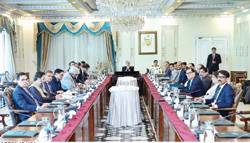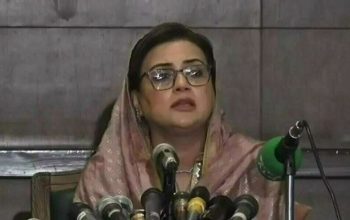The Supreme Court asked the Pakistan Tehreek-e-Insaf (PTI) on Monday to apprise it of its position on whether keeping the armed forces out of the ambit of the accountability law was a democratic act and how leaving parliament after being elected and seeking decisions through street power served democracy.
A three-member special bench of the apex court, headed by Chief Justice Umar Ata Bandial and including Justice Mansoor Ali Shah and Justice Ijazul Ahsan, heard the PTI’s petition against the recent amendments to the National Accountability Ordinance (NAO).
During the hearing, the bench asked Khawaja Haris, the lawyer for petitioner Imran Khan, to inform the court about the reasons behind keeping the military out of the ambit of the National Accountability Bureau (NAB) and whether or not such an act was constitutional.
Sitting on the bench, Justice Shah said that even judges were not out of the NAB law ambit. While referring to a point of argument from Haris that a parliamentarian was the holder of public trust, the judge further asked how the democratic system would work if a parliamentarian quits parliament and takes decisions on the streets.
Continuing his arguments, Haris said that the Supreme Court had filled the lacuna in the army chief’s extension case. He also referred to the Asfandyar Wali case, when the Supreme Court had declared amendments null and void.
On that Justice Shah said that in the Asfandyar Wali case, the court had struck down the law because it was in violation of human rights. He added that in the present case, the petitioner sought incorporation of what was missing from the law. He also said that the latest amendments were not against the fundamental rights.
Also sitting on the bench, Justice Ahsan said that the provisions which were removed from the NAB amendments made the law ineffective. In the present case, he added, the court was requested for the restoration of the NAB law in its original shape.
The chief justice remarked that there were many lacunae in the NAB law. In the law, he said, a person could be arrested for 90 days on a mere accusation. However, he added, the latest NAB amendments were also no breakthrough in the law either.
Khawaja Haris said that he was not in favour of the arrest during the investigation of any criminal case, including the NAB cases. However, he pointed out that even the best law became ineffective if there was no one to implement it.
The lawyer emphasised that he did not want the nullification of all the NAB amendments. He stressed the need for keeping in view the intention of parliament. For that, Justice Shah replied, the court would have to go through the parliamentary debate on the amendments.
Haris said that there was no discussion on the amendments when the law was passed. Justice Shah told the lawyer that the government lawyer took the stand that the NAB amendments were made in light of the decisions of the Supreme Court. Haris said that the amendments were not made on the basis of court verdicts.
Justice Shah also asked the PTI lawyer whether the public was also against NAB amendments, or it was up to the court to determine by itself that the people were being affected by the NAB amendments. The chief justice referred to the Darshan Masih case in which the public approached the court.
Has the public approached the court in the NAB amendment case, the chief justice asked. Haris replied that in the Darshan Masih case, non-governmental organisations (NGOs) had approached the court. He expressed the desire that NGOs should be formed against corruption as well.
Justice Shah said that a plea against the NAB amendments was also pending in the Islamabad High Court. He asked the lawyer to explain why the current case could not be sent to the high court. Later the bench adjourned further hearing until Tuesday (today).
Read the full story at the express tribune website.


